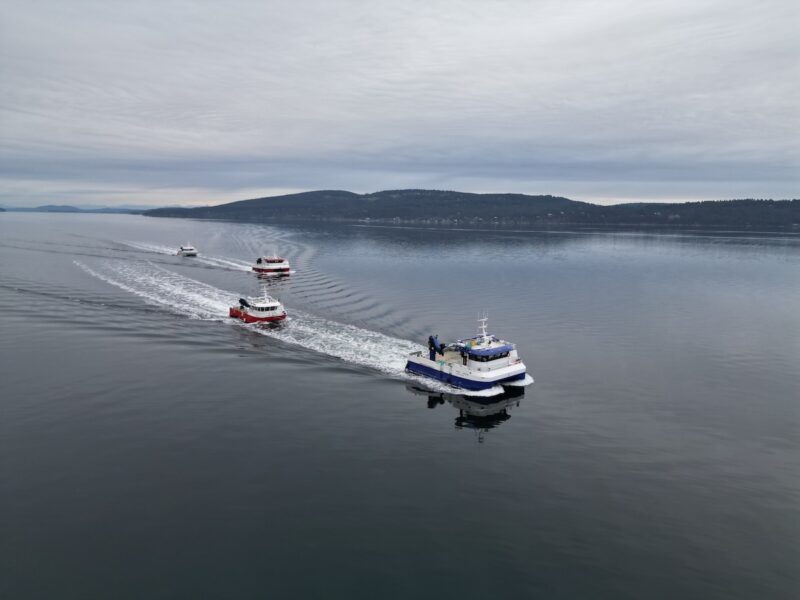Aquaculture jobs and vessels sail away from British Columbia
Aquaculture job losses mount as uncertainty grows over the future of salmon farming in British Columbia
By Fabian Dawson
SeaWestNews
The uncertainty over the future of salmon farming in British Columbia,has led to the loss of another 20 aquaculture-related jobs on Vancouver Island.
This past weekend, Njord Marine Service, a Campbell River-based company which provides aquaculture support services for BC’s salmon farmers, sent four of its ships to Norway to be sold.
“We have lost 20 jobs and about a third of our business, said Ian Durke, General Manager of Njord, which has been operating on Canada’s west coast since 2017.
Several other jobs and contracts to maintain and service the four vessels – Pacific Server, Nootka Server, Bravo 5 and Bravo 6 – have also been impacted, said Durke.
“We have now about 40 employees left and five other vessels as we wait to find out how the transition process play out,” he told SeaWestNews.
Durke said the company is being forced to downsize because of the uncertainty surrounding the future of salmon farming in British Columbia with the closure of farms in the Discovery Islands and the on-going transition plan.
The Discovery Islands decision to shutter 19 open-net salmon farms was originally made in 2020 by the Federal Government following threats by the anti-salmon lobby to withhold its support for the Trudeau Liberals.
The two previous Fisheries Ministers ignored their own scientists, who found in 10 peer-reviewed government studies that the farms had minimal impact on the wild fish migrating through the area.
The Discovery Island decision is now being challenged in the Federal Court by some First Nations, aquaculture support companies and salmon farmers.
It has already killed hundreds of jobs in the Lower Mainland and Vancouver Island and caused a 40 per cent reduction in salmon farming production in BC.
Prior to the Discovery Islands’ decision, BC’s salmon farmers announced a new plan by BC salmon farmers to directly invest $1.4 billion in innovation, new technology and infrastructure, to boost Canada’s post pandemic recovery.
The investments through 2050 would create almost 10,000 new jobs and add a cumulative $44 billion in new economic activity to propel Canada’s Blue Economy, said a report by RIAS Inc., an independent economics consulting firm.
Many aspects of this plan are now on hold because of the government decision to shut down salmon farms in the Discovery Islands.
The Transition Plan, expected later this year, will impact more than 4,700 aquaculture-related jobs and $1.2 billion in economic activity annually in British Columbia.
Currently in BC, all existing salmon farms are supported by the First Nations communities that they operate in.
The Coalition of First Nations for Finfish Stewardship (FNFFS) is calling for the immediate renewal of long-term salmon farm licensing to encourage investments in emerging technologies as well provide Indigenous communities time to conduct research and trials on new technologies in their territories.
The long-term licensing proposal is part of a First Nations-led, science-backed, and industry supported plan for salmon aquaculture that is responsible, realistic, and achievable, said the Coalition.
The Coalition recently delivered its plan titled, “Indigenous-led Finfish Aquaculture Transition Framework” to the new Fisheries Minister Diane Lebouthillier stressing it will drive the social and ecological well-being for their territories and communities and enhance food security and affordability for all Canadians.
The BC Salmon Farmers Association (BCSFA) said the sector has been facing significant challenges due to the Discovery Islands closures and the constant uncertainty around licence reissuance and the salmon farming Transition Plan.
“Due to these challenges, Njord has made the difficult decision to send four of its vessels to Norway for sale…these vessels were meticulously designed and built to support salmon farming in BC, and this departure signifies the loss of another 20 good-paying full-time jobs and the utilization of numerous subcontractors who played a vital role in keeping these vessels operational,” said BCSFA spokesperson Michelle Franze.
“This decision not only leaves the sector in short supply of specialized workboats but also results in the job loss of experienced local captains and crew members who have been integral to its operations,” she said.
“Unfortunately, other countries with greater business security in their salmon farming sectors will benefit from Canada’s uncertainty.
The latest job losses in BC’s salmon farming sector comes as the government reports that employment in the province decreased by 2,600 jobs (-0.1%) and the overall labour force decreased by 6,600 people (-0.2%) in January 2024.
The BC Business Council (BCBC) in its latest forecast report said that economic growth in the province is expected to slow in 2024, stressing in a statement that “the current investment climate is concerning.”
“Attracting large projects and new private sector investments is critical to the future prosperity of B.C.,” said BCBC President and CEO Laura Jones.
(Image courtesy of Njord Marine Service shows its four vessels heading to Victoria from Campbell River to be loaded on a cargo ship bound for Norway)

